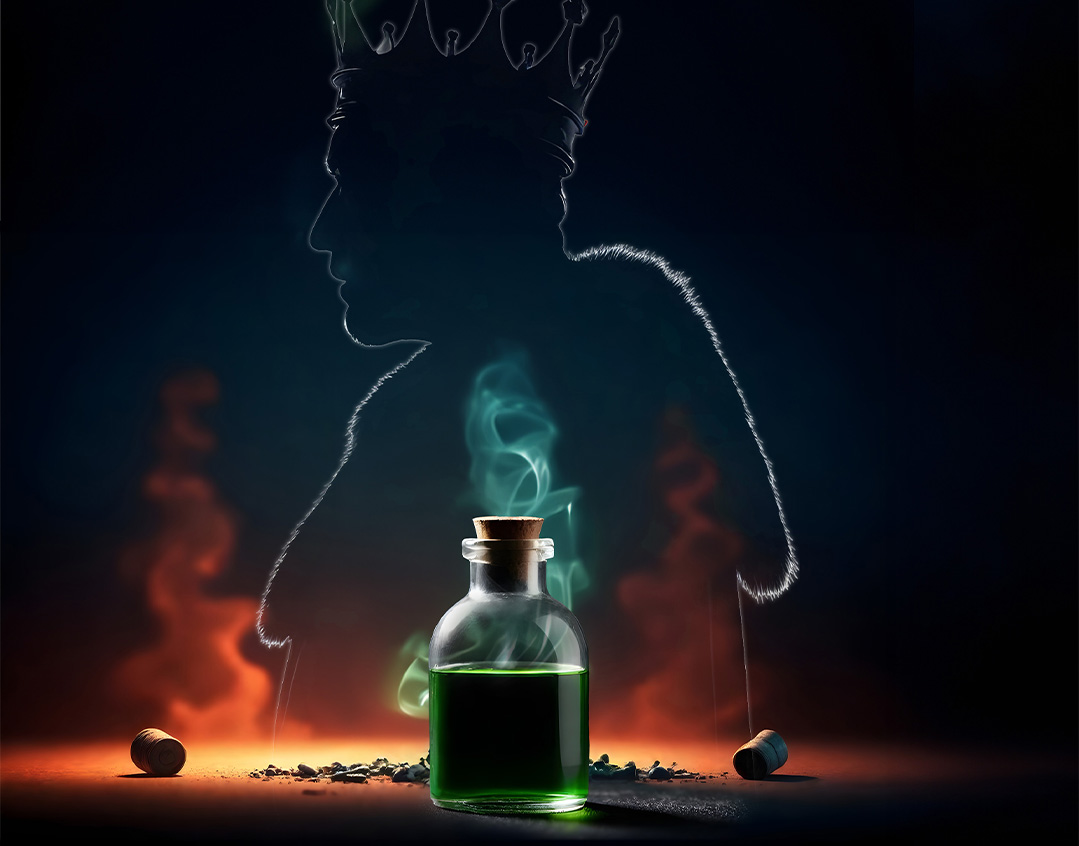Poisonous Politics

It’s mysterious, deadly, and one of the oldest ways to dispose of an enemy

Politics, the pursuit of power, requires a certain ruthlessness — but it can’t be too brazen. It has to be cloaked in duplicity; otherwise, one’s foes will always be on guard.
So it follows, then, that a favorite weapon of power brokers down through the millennia should have the same characteristics; it should be able to catch its victims unawares, and it should be absolutely deadly. This is why poisoning has such a long and sordid history.
Poisoning requires direct contact and intimate acquaintance with the victim. It almost always implies betrayal. It requires someone from the inner circle who can approach the victim without arousing suspicion and administer the fatal dose.
In Megillas Esther, guards Bigsan and Teresh planned to poison King Achashveirosh. They had access to the king’s private world, and if it weren’t for Mordechai Hatzaddik, they would have succeeded. Most leaders aren’t as lucky as Achashveirosh.
Perhaps most intriguingly, there must always remain a shroud of uncertainty. In fact, many of the cases of historical poisonings we’ll outline here have not been conclusively proven, although circumstantial evidence suggests they were not “natural deaths.” And the list of deaths caused by toxins that are completely unsuspected must surely be much longer. That is, after all, the goal of those who use poison.
Ancient Indian physicians are believed to have discovered healing herbs that could be beneficial in low doses, but deadly in high doses. However, the earliest Western records of poisoning date to around 400 BCE, and relate to the death of one of the most prominent figures in history, Alexander the Great.
Once the use of lethal agents became widespread, it depended only on the customs of the time and place. One Hellenic king, having seen his own father be poisoned, became so paranoid that he began consuming small doses of arsenic daily to build resistance. Later, it was common for a Roman emperor to have too many heirs; each of his consorts wanted her son to inherit the throne. Ending the emperor’s life at the right moment, in the right way, was often efficacious.
One clan during the Italian Renaissance came to symbolize poisoning, because they used it to gradually eliminate their various enemies, and even developed their own poison. Closer to our time, one of the great conquerors of the 19th century was believed to have died from poison, to keep him from embarking on a new wave of conquest. And even in our days, there are still iron-fisted rulers, like Vladimir Putin, who try to silence opponents, like his nemesis Alexei Navalny, with the ancient art of poisoning.
Here we present the strangest and most significant cases, to understand how humanity has adopted poison as a political weapon. Some of these victims are well known; others you will be reading about for the first time. But one thing is certain: Poisoning has left its mark on the history of humanity, whether or not it can be detected.
Brief Life and Great Exploits
Who: Alexander the Great
Where: Babylon
When: 323 BCE
Method: Poisoned wine
There have been many conquerors throughout history, but if one is dubbed “the Great,” there must be a reason. Alexander III of Macedon, better known as “Alexander the Great,” was one of the greatest military minds to walk the earth.
Under his rule, the small kingdom of Macedonia expanded to encompass one of history’s largest empires, stretching from Greece to India, and his army became one of the most feared in antiquity. Among the titles accruing to him due to the vast swaths of land under his control: King of Macedonia, Hegemon of the Hellenic League, Pharaoh of Egypt, and King of Persia.
Great men also engender great hatred. Political leaders, for their part, tend to harbor a certain suspicion about their closest men. Alexander had ceased to trust someone in his inner circle who had even served under his father, Philip II of Macedonia —Antipater, a decorated military and political leader. Antipater commanded Macedonian forces in their victory over the powerful Spartans, which greatly boosted his reputation — and pride.
Some historians say that Alexander was jealous of Antipater, but others argue that Antipater’s poor relationship with Princess Olympias of Greece made him a liability to Alexander. Whichever it was, Alexander the Great demoted Antipater from his post as viceroy of Macedonia and dispatched him to lead troops in Asia.
Later, in Babylon, Alexander spent a night drinking with close officers, and afterward contracted a very severe fever that eventually took his life. Some specialists say the wine had been poisoned with a potent plant called veratrum album. Many fingers point to Antipater, particularly because his son, Iollas, was Alexander’s wine-pourer.
The impact of Alexander’s death was immense. He was only 32 when he died, and he left a vast unfulfilled potential for further conquests. Because his reign relied so heavily on his persona, everything began to crumble upon his death.
Alexander’s death offers a prime example of the dictum that a quintessential trait of great leaders is the ability to appoint a worthy successor.
The Immune One
Who: King Mithridates of Pontus
Where: North of the Black Sea
When: 63 BCE
Method: Resistance to poison
K
ing Mithridates VI of Pontus, a small Hellenic region that held out against the mighty Roman Empire longer than many thought possible, had a life marked by poison. He was 15 when his father, King Mithridates V, was killed by arsenic during a banquet. The young man succeeded his father, sharing the throne with his mother Laodice and a younger brother named Mithridates Chestus. Having seen firsthand how lethal poison could be, Mithridates began consuming small doses of arsenic, to build resistance to its toxicity.
Mithridates’ life became a Greek tragedy. His mother Laodice preferred his brother, which forced Mithridates to flee into exile. After four years, in 116 BCE, he returned to his land and reclaimed the throne. He sent his mother and his brother to prison, where they would die, according to official records, of “natural causes.”
Under Mithridates VI’s rule, the kingdom of Pontus came to dominate the region around the Black Sea (to place it on today’s map, parts of Turkey, Bulgaria, Georgia, Russia, and Ukraine), something that greatly annoyed the Romans. The last straw for the Romans came when, after Mithridates entered victorious into Anatolia, he ordered the massacre of all Roman citizens in the region — some 80,000 people.
This act unleashed Rome’s fury. Although Mithridates managed to confront them in several battles, he would be defeated by Rome’s General Pompey, forcing him to escape to the northern area of the Black Sea. There, he attempted suicide, but his past would come back to haunt him: He tried consuming arsenic, but his body resisted! Finally, he had to ask his bodyguard Bituitus to take him out of this world.
When in Rome…
Who: Emperor Augustus
Where: Naples, Italy
When: 14 CE
Method: Poisoned figs
The grand creator, architect, and founder of the Roman Empire was Gaius Julius Caesar Augustus, also known as Octavian, or simply Augustus (we’ll stick with this for practical purposes). He was the first to consolidate all power into a single office and organize the vast territory into provinces that answered to the Imperial throne in Rome. He was the great-nephew of the famous Julius Caesar, who formally adopted him as a son and named him as his heir.
Augustus rose to power when Julius Caesar was assassinated. He became part of the “Second Triumvirate,” sharing power with Mark Antony and Lepidus, two other prominent politicians. But ambition knows no bounds, and, after waging victorious battles against his rivals, Augustus became the first emperor of Rome.
Emperor Augustus was a formidable conqueror, adding the territories that are now Spain, Portugal, Italy, Switzerland, Slovenia, Austria, Albania, Croatia, Serbia, parts of Turkey, Egypt, Syria, and yes, Israel. The immense power that Augustus came to hold would eventually pose a “fatal” problem.
The question of who would succeed Augustus loomed large. Some believed it would be his nephew, Marcellus; others pointed to his brother-in-law, Marcus Agrippa. Some mentioned his grandchildren, Gaius and Lucius. But no one consulted Livia, the wife of Emperor Augustus. She had children from a previous marriage and wanted one of them — her son Tiberius — to be the heir. Augustus did settle on Tiberius as his heir, but according to myth, to hasten her son’s ascension to the throne, Livia fed Augustus poisoned figs.
It’s worth noting that Augustus was benevolent toward the Jews under his rule. He decreed the inviolability of sacred texts and synagogues, and granted Jews permission not to appear in court on Shabbos.
Emperor Augustus died uttering the famous phrase, “Have I played the part well? Then applaud as I exit [Acta est fabula, plaudite].” A farewell worthy of a novel, much like his entire life.
Eat Your Mushrooms
Who: Emperor Claudius
Where: Rome
When: Year 54
Method: Poisoned mushrooms
IF there’s an underdog among Roman emperors, it’s undoubtedly Claudius. The son of a military man, he had always been sidelined by his family. He had a limp and was hard of hearing — traits that would miraculously catapult him to the throne. None of his rivals ever took him seriously as a threat.
Claudius was connected to the nobility (he was the nephew of the aforementioned Tiberius, the emperor who succeeded Augustus), which gave him a certain degree of influence when Caligula, his nephew, became Roman emperor after the death of Tiberius. Caligula appointed his uncle Claudius as consul, but publicly humiliated him at every opportunity.
Caligula was eventually assassinated. Claudius (said to have been among the plotters) emerged as the contender with the most distinguished lineage and, through skillful maneuvers and elimination of opponents, he seized power in Rome.
Claudius proved to be more capable as a ruler than many thought possible. But it’s often easier to govern an empire than to maintain peace at home. The emperor had married numerous times, which resulted in more than one potential heir to the throne. The natural heir to the throne was Britannicus, Claudius’s son with his third wife, Valeria Messalina.
However, Claudius married a fourth time, to a woman named Agrippina, who already had a son named Nero, adopted by the emperor, and whom his mother wanted to see on the throne. Rumors circulated that Claudius would designate Britannicus as the future emperor. So Agrippina preempted him and gave her husband poisoned mushrooms. The plan ended as Agrippina had intended; after Claudius’s “sudden” death, Nero was crowned emperor.
A Jealous Cousin
Who: Emperor Zhi of the Han Dynasty
Where: China
When: Year 146
Method: Poisoned Food
While stories of emperors being crowned at very young ages abound, the case of Emperor Zhi of China’s Han Dynasty is unique. Not only did he ascend to the throne at the tender age of seven, but he replaced his cousin, Emperor Chong, who died at the age of two (he had been made emperor when he was just a year and a half old).
Beyond the formalities, the one who truly pulled the strings was the emperor’s cousin, Liang Ji — notorious for being corrupt, ambitious, and unscrupulous. He thought he could easily control the child emperor.
Legend has it that the very young leader realized his cousin was not an exemplary person and called him “an arrogant general” at a public gathering. It wasn’t the best idea.
Shortly thereafter, Liang Ji ordered that a poisoned bowl of pastry soup be brought to Emperor Zhi. Immediately, the leader began to experience severe abdominal pain and asked for water — but his cousin had also forbidden any servant from bringing him water. Emperor Zhi died that very day, at the age of only eight. The imperial household ordered an investigation, but, of course, the Machiavellian Liang Ji was absolved of all guilt.
Liang Ji would eventually meet his violent end at the hands of Emperor Huan, who ordered that his entire clan be wiped out.
The Mob of Their Day
Who: The House of Borgia
Where: Spain, Italy, France
When: The Renaissance
Method: Poisoning as a family business
R
enaissance Europe was a breeding ground for feuds, schemes, and disputes, and one of the main players was the House of Borgia. The family was originally from Spain but extended its influence to France, eventually making its base in Italy. The Borgias’ fame was matched only by their reputation for cruelty.
One family member stood out for her notoriety as a poisoner: Lucrezia. Her father married her off three times, with the aim of securing financial backing from grooms’ families. Though recent historical revisionism has sought to soften her image, stories of the period depict her as a political strategist who resorted to murder to achieve her objectives. Her second husband died under suspicious circumstances.
There is no proven record of poisoning any figure from the political forefront of the time. However, it is known that the Borgias resorted to “toxic crimes” to settle their affairs. One version has it that Lucrezia’s ring had a secret compartment for carrying “cantarella,” the Borgias’ favorite poison.
The House of Borgia declined in importance and influence and vanished in 1748. Nonetheless, stories of their deeds have persisted through the generations.
Money Matters
Who: Napoleon Bonaparte
Where: Island of Saint Helena
When: 1821
Method: Arsenic
Few individuals in history have aroused as much fascination as Napoleon Bonaparte. The French emperor stands at the pinnacle of military leaders and statesmen, and his death, like his life, has been meticulously studied.
Originally from Corsica, Napoleon grew up in an Italian noble family that fought against the French forces that conquered their homeland. He enrolled in the Military School in Paris and, already pursuing an army career at the time of the French Revolution, he became close to the controversial revolutionary leader Maximilien Robespierre.
Napoleon accompanied his military exploits during the Revolution with a keen interest in national politics (he even founded two newspapers). After achieving national hero status for winning victories in Egypt, he launched his political conquest of France. He fostered the coup known as the 18 Brumaire and skillfully maneuvered himself into the title of “First Consul,” a precursor to declaring himself emperor.
Under Napoleon’s leadership, the French Empire controlled 40 percent of Europe’s population. However, nothing is enough for an ambitious conqueror. The beginning of the end was his attempt to conquer Russia. The final blow came with his defeat in the Battle of Waterloo. The emperor was eventually captured by British troops on July 15, 1815. He was detained on the island of Elba, and had a brief resurgence when he managed to escape. But it would not last.
In the end, Napoleon was exiled to the island of Saint Helena, where he began to suffer health complications and would ultimately die in 1821. Suspicions arose that the causes of his death were not natural. Several autopsies showed that his body had an extremely high level of arsenic, and the emperor showed symptoms in his final days similar to those presented by arsenic poisoning.
His previous escape from Elba made him a risk to the victorious European powers. Though Napoleon no longer enjoyed massive popular support, his military brilliance was undeniable. If he was poisoned, one must contemplate the historical impact, for had he managed to escape from St. Helena, it would have sparked massive upheaval in Europe.
The primary suspect in the poisoning is Charles Tristan, Marquis de Montholon. This man presented himself as extremely loyal to Napoleon, although many historians portray him as a liar and ambitious person who also happened to be the main beneficiary in the emperor’s will.
Don’t Mess with Kim
Who: Kim Jong-Nam, half-brother of North Korean leader Kim Jong-Un
Where: Malaysia
When: 2017
Method: Brother’s Revenge
The lack of press freedom makes it very difficult to know exactly what happens in North Korea. But one thing is certain; no one makes a move without the approval of supreme leader Kim Jong-Un. However, there was a time when many believed Kim Jong-Un would never come to power. Conventional wisdom held that his older half-brother, Kim Jong-Nam, would inherit the reins of the Worker’s Party of Korea. But a chain of events led to the eldest Kim being nudged aside.
Many believe that what ended Kim Jong-Nam’s chance of coming to power was his embarrassing attempt to visit Disneyland in Tokyo with a fake passport. Photos of the son of North Korean leader Kim Jong II being detained at Narita Airport made the ruling family an international laughingstock. Kim Jong-Nam himself claimed that his more reformist vision for the country was unacceptable to the Politburo.
Whatever the case, when little brother Kim Jong-Un assumed total power in North Korea in 2011, he wouldn’t tolerate criticism from any quarter. But that criticism wasn’t long in coming.
In a 2012 book titled My Father, Kim Jong-II, and Me, based on interviews with Kim Jong-Nam, the elder brother asserted that Kim Jong-Un’s government would soon fall because he was a young, inexperienced ruler.
It was a curious choice. Kim Jong-Nam had been living in Macau since 2003, and could come and go from North Korea as he pleased. But he had survived a 2006 assassination attempt in Hungary. When he dodged another attempt on his life in 2012, he reportedly wrote to his brother begging for his life.
On February 13, 2017, while Kim Jong-Nam was at Kuala Lumpur International Airport in Malaysia, two women approached him. One threw a liquid at him, and the other covered his face with a wet cloth. Kim Jong-Nam died between 15 and 20 minutes later.
Doctors confirmed that he had been poisoned with VX nerve agent, a chemical weapon prohibited by the Chemical Weapons Convention of 1993, to which North Korea obviously does not subscribe.
The Death of Stalin
Who: Joseph Stalin
When: 1953
Where: Kuntsevo (USSR)
Method: Blood-thinner
IN
Mishpacha’s Succos issue, we meticulously analyzed a theory that, while debatable, didn’t sound so far-fetched when viewed in the context of Russian history: the death of Joseph Stalin. The Soviet dictator had already experienced a string of health problems (strokes and heart attacks), and he was 74, so the official finding that he died of a hemorrhagic stroke holds water.
However, some loose ends remain. First, Stalin agonized for three consecutive days, vomiting blood and displaying blue cyanosis (a grayish tinge around the lips). For those in the know, these symptoms have little to do with a stroke. Furthermore, the treatment that doctors administered is perplexing: they applied leeches, an anti-coagulant intended to treat a stroke caused by a blocked artery. But in the case of a brain hemorrhage, that same treatment has the opposite effect — accelerating the rate of bleeding.
For these reasons, many argue that Joseph Stalin was actually poisoned. As Jonathan Brent, author of Stalin’s Last Crime, explained to Mishpacha, “If indeed Stalin was poisoned, then warfarin — a blood-thinner — would have been the poison of choice. That’s because Stalin was paranoid, and so anyone who ate with him had to taste some of his food.
“But Warfarin is not harmful in small doses. It’s only deadly in elevated doses over a period of five days. So it’s a perfect poison, because anyone at the last dinner could have had a sip of Stalin’s wine and a taste of his kasha and then walked away. Only Stalin, with the deadly buildup of the blood thinner in his system over a number of days, would have been affected.”
The Putin Saga
Who: Viktor Yushchenko, Alexander Litvinenko, Sergei Skripal, Alexei Navalny
Where: Russia, Ukraine, England
When: Since the early 21st century
Method: Nerve agents
The consolidation of power by Russian president Vladimir Putin has been accompanied by a string of deaths of political opponents that should, at the very least, raise eyebrows. Russian history has shown that intimidation of opponents is an inevitable method of Soviet lineage. And the Kremlin has carried out that intimidation within former Soviet territories.
Since its independence in 1991, Ukraine has been divided between two major political factions: those who want to join the West and those who want to maintain an indivisible bond with Russia. In 2004, the two forces clashed in the election between Viktor Yushchenko (pro-Western) and Viktor Yanukovych (pro-Russian).
In September that year, a month before the elections, Yushchenko fell extremely ill and was taken to Vienna for treatment. Tests showed he was poisoned with chemicals not derived from food. After many studies, it was revealed: Yushchenko had been poisoned with TCDD dioxin. Doctors managed to save his life, but his face was disfigured. This did not prevent him from being elected president of Ukraine.
Alexander Litvinenko, a former agent of Russia’s Federal Security Service (the successor to the KGB), would not have Yushchenko’s luck. Since 1998, Litvinenko had publicly denounced his superiors for forcing him to commit crimes and persecute opponents. This earned him constant harassment and detention until he emigrated to London in 2000. There he became one of the loudest voices calling out Putin, accusing him of murder and coining the term “mafia state” to refer to Russia.
On November 1, 2000, Litvinenko fell ill, and two days later, he was hospitalized in London. The same day he began to feel unwell, he had met with two former Russian intelligence agents in a hotel. Subsequent investigations showed that there were extremely high levels of polonium-210 at the meeting place. On November 23, after several days of agony, Litvinenko died.
Sergei Skripal is a former agent of the Russian military intelligence (GRU) who also worked as a double agent for British intelligence (MI6). After finishing his duties as a Russian officer, he worked in the Russian Foreign Ministry while maintaining his status as an undercover agent for the British. He is estimated to have begun working for London in 1995, but only in 2006 was Russian justice able to convict him of spying for Britain.
Despite being sentenced to 13 years in prison, he regained his freedom in a spy swap, at which point he moved to England. On March 4, 2018, both Skripal and his daughter Yulia were found “slipping in and out of consciousness on a public bench” in the town of Salisbury. They were immediately taken to the hospital and put into a coma to prevent damage.
The case reached the highest political levels when then-British prime minister Theresa May accused Russia of poisoning Skripal with the nerve agent Novichok. She expelled 23 Russian diplomats. On May 18, Skripal left the hospital, and according to media reports, he now lives in New Zealand under a new identity.
The recently deceased Alexei Navalny was the last major figure who dared to confront Putin. A lawyer by profession, Navalny was always involved in dissident politics, gaining a massive following through successive detentions. Navalny was a loud voice denouncing corruption, lack of democracy, and persecution of opponents in Putin’s Russia, and he paid a heavy price for it.
On August 20, 2020, while flying from Tomsk to Moscow, Navalny began to feel unwell. The plane had to make an emergency landing so that he could be hospitalized in the town of Omsk, where he was placed in a coma. Navalny was taken on a medical flight to Berlin, where doctors discovered that the activist had been poisoned, like Skripal, with the Novichok nerve agent.
A month later, traces of this agent were found in a water bottle that Navalny had consumed at the hotel in Tomsk. Despite the obvious danger to his life, Navalny returned to Russia, where he was detained, and where he died on February 16 in a Siberian prison. Authorities withheld Navalny’s body from his family for more than two weeks — which some experts noted would be long enough to throw off toxicology tests.
(Originally featured in Mishpacha, Issue 1005)
Oops! We could not locate your form.







